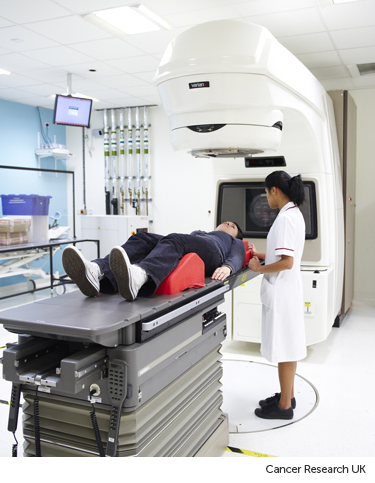Radiotherapy for metastatic bladder cancer
Radiotherapy uses high energy waves similar to x-rays to destroy bladder cancer cells. You might have it to control the symptoms of metastatic or advanced bladder cancer. Metastatic bladder cancer means the cancer has spread from the bladder to other parts of the body.
When bladder cancer has spread, it can no longer be cured. Radiotherapy treatment can often control the cancer, help to reduce symptoms and make you feel better. This is sometimes called palliative radiotherapy.
This page is about palliative radiotherapy for bladder cancer. This is different to radiotherapy to try and cure your bladder cancer.
When do you have radiotherapy for metastatic bladder cancer?
Your doctor might suggest radiotherapy if your bladder cancer is causing symptoms. Radiotherapy will not cure your cancer but it can improve the quality of your life. It can help to keep the cancer under control in the area of the body that has been treated.
For example, you might have radiotherapy to:
- control pain from cancer that has spread to the bones
- control bleeding in your bladder
- help with problems passing urine, such as frequency or being unable to wee
- control pain in your pelvis if your cancer has spread into nearby structures or tissue
- slow down the growth of the cancer in your pelvis
You might have had radiotherapy to your bladder and pelvis when you first had treatment. If this is the case then you probably won't be able to have any more to that area of your body. This is because there is a limit to the amount of radiation any part of the body can have. But you can have radiotherapy to another part of the body if your need it.
Before treatment
You have a planning session which lasts around 90 minutes.
How you have it
You have radiotherapy treatment in the hospital radiotherapy department. You often only have one treatment session. But some people have a few treatment sessions.
The radiotherapy room
Radiotherapy machines are very big and could make you feel nervous when you see them for the first time. The machine might be fixed in one position. Or it might rotate around your body to give treatment from different directions. The machine doesn't touch you at any point.
Before your first treatment, your  will explain what you will see and hear. In some departments, the treatment rooms have docks for you to plug in music players. So, you can listen to your own music while you have treatment.
will explain what you will see and hear. In some departments, the treatment rooms have docks for you to plug in music players. So, you can listen to your own music while you have treatment.

During the treatment
You need to lie very still. Your radiographers might take images (x-rays or scans) before your treatment to make sure that you're in the right position. The machine makes whirring and beeping sounds. You won’t feel anything when you have the treatment.
Your radiographers can see and hear you on a CCTV screen in the next room. They can talk to you over an intercom and might ask you to hold your breath or take shallow breaths at times. You can also talk to them through the intercom or raise your hand if you need to stop or if you're uncomfortable.
You won't be radioactive
This type of radiotherapy won't make you radioactive. It's safe to be around other people, including pregnant women and children.
Travelling to radiotherapy appointments
You might have to travel a long way each day for your radiotherapy. This depends on where your nearest cancer centre is. This can make you very tired, especially if you have side effects from the treatment.
You can ask the  for an appointment time to suit you. They will do their best, but some departments might be very busy. Some radiotherapy departments are open from 7 am till 9 pm.
for an appointment time to suit you. They will do their best, but some departments might be very busy. Some radiotherapy departments are open from 7 am till 9 pm.
Car parking can be difficult at hospitals. Ask the radiotherapy staff if you are able to get free parking or discounted parking. They may be able to give you tips on free places to park nearby.
Hospital transport may be available if you have no other way to get to the hospital. But it might not always be at convenient times. It is usually for people who struggle to use public transport or have any other illnesses or disabilities. You might need to arrange hospital transport yourself.
Some people are able to claim back a refund for healthcare travel costs. This is based on the type of appointment and whether you claim certain benefits. Ask the radiotherapy staff for more information about this and hospital transport.
Some hospitals have their own drivers and local charities might offer hospital transport. So do ask if any help is available in your area.
Side effects
Side effects from radiotherapy depend on which part of the body is being treated. So it is difficult to say what side effects you might have.
When you have radiotherapy to treat symptoms, doctors try to keep the side effects down to a minimum. You may not have many side effects if you are having one treatment, or a short course.



